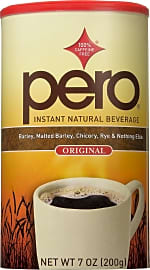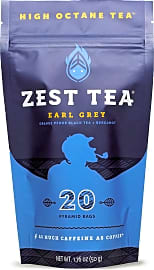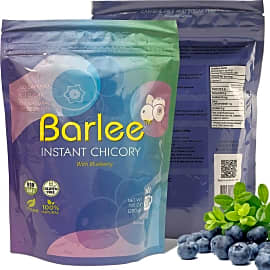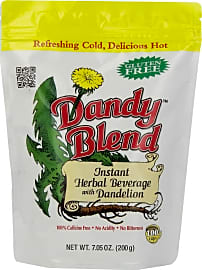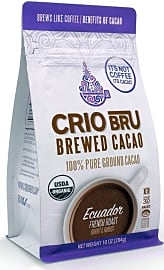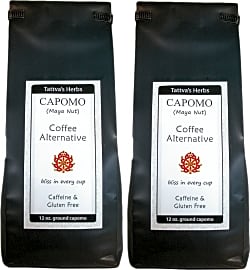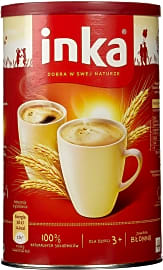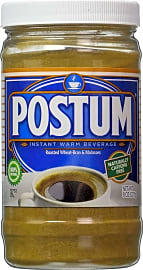The 10 Best Coffee Substitutes

This wiki has been updated 36 times since it was first published in May of 2016. Although most of us can't even think before we've had that first cup of joe in the mornings, many people are unable to tolerate the acidity, the caffeine, or even the flavor of regular coffee. Luckily for those unfortunate folks, there are plenty of alternatives. Try one of these delicious substitutes and see if they can provide you with that needed pick-me-up without any of the discomfort. When users buy our independently chosen editorial picks, we may earn commissions to help fund the Wiki.
Editor's Notes
November 04, 2020:
Among our priorities when updating this list was ensuring we kept it as diverse as those who enjoy their coffee alternatives, so you'll find everything from ground cacao and chicory to fruit enhanced options and even highly-caffeinated tea. The goal was to provide solid substitutes for people who are switching over from coffee for a multitude of reasons, whether due to stomach issues or mental health reasons.
While we still think Coffig Original Roasted Fig Beverage is a strong contender, the taste can be polarizing and many feel it doesn't quite clear the bar as a stand in for coffee. It's also pricey for such a small amount. We thought we'd bring on Barlee Alternative in its stead, which has the subtle fruitiness of blueberry along with the health benefits of chicory and nutty, earthy taste reminiscent of coffee. It has fewer calories than Coffig and can be made instantly.
Also joining the ranks today is Crio Bru Ecuador French Roast, a cacao-based drink that offers a strong, extremely pleasant chocolate aroma during preparation. It's bright and subtle with an earthy flavor and is roasted, ground, and brewed just like coffee, so it's easy to use in your standard drip machine. Drinkers also benefit from its inherent antioxidants and natural energy boost.
Something some people don't immediately think of is how versatile these substitutes can be in recipes. Dandy Blend Herbal is great when you're looking to add coffee flavor to a dessert, while Tattva's Herbs Capomo is solid for adding nuttiness and various extra nutrients to a smoothie or pre-workout drink.
November 08, 2019:
People can be just as divided on their coffee substitute preferences as they are on how they take the real stuff, so we made sure that, whether you are into dark and bold, sweet and light, or complex and nutty when you sip on actual java, you'll find something to your liking on this list.
Those looking for an uplifting beverage with health benefits will like Tattva's Herbs Capomo, which is rich in vitamins and minerals, and Pero Natural, which boasts prebiotic properties. Dandy Blend Herbal caught our attention, too, with just seven calories per serving. On that note, we removed Vergonix Capomo, as it, unfortunately, had a whopping 50 calories per serving — which really adds up if you consume several cups a day.
While many of our options seek to mimic the flavor of regular joe, if that's not what you're after, but you do want significant caffeine, there is Zest Tea High Octane. It should energize you just as much as that cappuccino or espresso would have. Coffig Original Fig Beverage is also a good choice for those looking to branch out beyond the flavor of roasted beans, as it's made of its namesake fruit and is slightly sweet.
If you do, after all, want your warm drink to resemble true coffee as much as possible, Teeccino Medium Roast Vanilla Nut Chicory is a great choice. You can even use your standard drip coffee maker to brew the stuff. While Cafix Crystals came quite close in taste to the real stuff, it did, upon further inspection, contain carcinogenic ingredients, so it had to be removed.
Special Honors
Mud/WTR If what you'll miss the most about real coffee is the bold and exciting blends your local cafe always seems to offer, you can recapture some of that with this alternative. With turmeric, cacao, cinnamon, mushrooms, and a chai blend, it's sure to wake up your taste buds — and you. If you're on the Whole30 diet, you'll like that this stuff is compatible with that. It has 1/7th the caffeine of real java, for a subtle but still detectable buzz. mudwtr.com
Sips By Tea If you're looking to ditch the coffee and dip a toe in the tea world, Sips By is a subscription service that arranges personalized tea boxes every month. Members are matched with four premium teas from around the globe that are tailored to their specific tastes. That means java lovers can request bold, highly-caffeinated, and/or robust roasted offerings to suit their preferred flavor profile. sipsby.com
Benefits Of Drinking Coffee Substitutes
Chicory is one such ingredient in many coffee alternatives.
The dark, bold flavor of coffee is unique, and people weaning off of coffee say it is difficult to replace. With that in mind, the experience most coffee substitute brands go for is that bold, richly roasted flavor that comes from real coffee beans. This means high-quality coffee substitutes provide a very similar flavor and mouthfeel as coffee.
Coffee substitutes are often made of roasted grains and roots that are pulverized and made into a water soluble powder for use, like instant coffee. The ingredients used in many coffee substitutes have benefits beyond their distinctive flavor. Chicory is one such ingredient in many coffee alternatives. Chicory is a high-fiber root that has been extensively studied for its impact on health. It contains anti-inflammatory compounds called polyphenols. These polyphenols can protect blood cells and reduce inflammation and toxins in the body. Chicory may also protect the liver from free radical damage, and may even help prevent the onset of type 2 diabetes. The fiber in chicory may also improve gut health and relieve constipation.
Dandelion root is also found in many coffee substitutes. Dandelion root is packed with nutrients, like vitamins A, C, and K. It is also a rich source of calcium. Drinking dandelion tea can help fight diabetes, cleanse the liver, and protect against signs of atherosclerosis. Roasted grains like barley make up the base of many coffee substitutes. Barley tea has an impressive blend of nutrients and antioxidants that can help the body stay balanced. Barley tea improves blood circulation and digestion, and can even block invading oral pathogens. It is also low in calories and helps fight against free radical damage in the cells. The benefits of a particular coffee substitute will vary based on any additional ingredients it contains.
Coffee Vs Coffee Substitute; Which Is Better?
Caffeine is the most widely used psychoactive drug on the planet, and it has a range of physical and psychological effects when taken. It is the most significant ingredient found in coffee, though caffeine is also commonly found in tea, soft drinks, and workout drinks.
Coffee substitutes are usually a much healthier choice than coffee in the long term.
Caffeine from coffee appears to be good for athletes. Mixing caffeine with carbs can replenish glycogen in the muscles and reduce pain in the muscles after an intense workout. This is why caffeine is often added to protein powders and workout recovery drinks. There is also some evidence that the mental stimulation from caffeine can help keep cognitive diseases like Alzheimer’s at bay. It may also help reduce inflammation in some users, and has even been linked to weight loss in multiple studies.
It is not all good news for coffee, however. Coffee increases stomach acid production in the body, which can make symptoms like acid reflux and ulcers much worse. Many people with GERD switch to coffee substitutes to find relief from their symptoms. While coffee provides high levels of antioxidants in each sip, it also releases diterpenes into the body. Diterpenes have been linked to high cholesterol and triglyceride levels. Many coffee alternatives are likewise packed with antioxidants, but have little risk of raising cholesterol or triglyceride levels.
Coffee is well known for the stimulating effect it has on the brain, but it actually stimulates the body in similar ways. Caffeine prompts the body to break down fat stores and release fatty acids into the bloodstream. This can result in lasting energy; up to 12 hours from a single cup of coffee. However, a regular coffee drinker will quickly develop a tolerance to these effects and require more and more caffeine to feel the same energy increase. There is less chance of developing a similar tolerance for coffee substitutes, so their benefits may be enjoyed every day.
Caffeine tolerance may also decrease insulin sensitivity and increase the risk of type 2 diabetes. High caffeine intake can release chemicals into the body that cause inflammation and make a person feel stressed. Coffee can also make a person pass more minerals through the urine, causing an electrolyte imbalance in the body. These problems are virtually nonexistent with coffee substitutes, as they do not stimulate the nervous system in the same way as coffee. Coffee substitutes are usually a much healthier choice than coffee in the long term.
Are Coffee Allergies Real?
When asked why they drink coffee substitutes instead of coffee, many people will cite a coffee allergy. Coffee allergies are possible, though they are not as common as anecdotal evidence would make it seem. Most cases of coffee allergies are actually sensitivities to one or more other ingredients in the coffee.
It is possible to be allergic to coffee beans, though recorded cases are extremely rare.
Most people who say they are allergic to coffee are actually caffeine sensitive. A caffeine sensitive person will experience many symptoms when they drink coffee that other people do not. Caffeine can make people jittery, nervous, anxious, and restless. It may cause a person to feel extremely irritable or agitated, and even cause insomnia. Physically, caffeine can cause a drastic increase in the heart rate or blood pressure of sensitive individuals. It may also cause muscle spasms and digestive disorders. Sensitivity to caffeine can build up over the years, and there may also be a genetic predisposition to symptoms of caffeine sensitivity in some people. Many people who make the switch to coffee alternatives find their symptoms subside immediately.
An assumed coffee allergy in some people may also be an allergic reaction to added ingredients, like milk or even sugar. Lactose intolerance can produce digestive symptoms that many confuse with a coffee allergy. These include symptoms like nausea, severe cramping, and diarrhea. It is also possible to have a reaction to the acids in coffee. Creating a very acidic environment in the digestive system by drinking coffee on an empty stomach can cause digestive upset and symptoms like nausea, gas, and bloating.
It is possible to be allergic to coffee beans, though recorded cases are extremely rare. A true coffee allergy like this would produce symptoms within the first hours after coming into contact with coffee. Symptoms of an allergic reaction to coffee often include skin rashes, nausea, vomiting, and shortness of breath.



